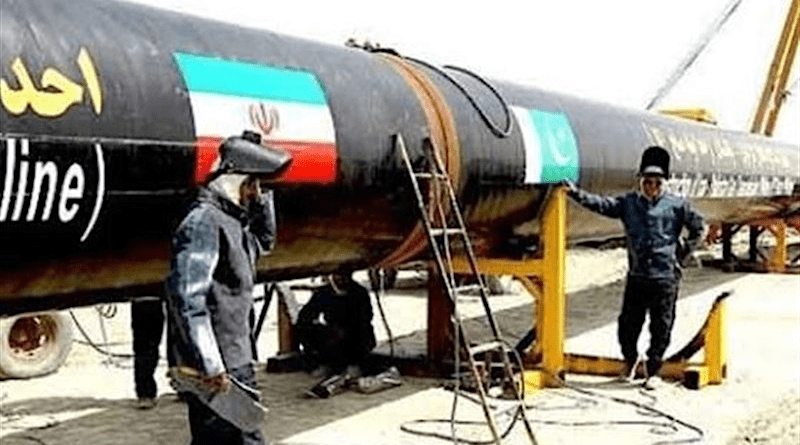Pakistan’s Pursuit Of Energy Security – OpEd
By Dr. Sahibzada Muhammad Usman
The Pakistan-Iran gas pipeline project, originally conceived as the Peace Pipeline in 1995, has traversed a tumultuous path marked by geopolitical tensions and shifting regional dynamics. Spearheaded by former Prime Minister Benazir Bhutto, the project aimed to alleviate Pakistan’s energy woes while fostering regional cooperation. However, entrenched interests, including US sanctions on Iran and India’s security concerns, impeded progress. Despite obstacles, Pakistan’s recent reaffirmation of commitment to the pipeline underscores its strategic significance for energy security and regional stability.
Benazir Bhutto’s visionary leadership laid the groundwork for the Pakistan-Iran gas pipeline project in the mid-1990s. Envisioned as a conduit for Iranian gas to reach Pakistan and potentially India, the corridor promised substantial economic benefits and strengthened regional ties. However, the project encountered formidable challenges, primarily due to US sanctions on Iran and India’s reluctance to engage in energy cooperation amidst security apprehensions.
In 2013, during President Asif Zardari’s tenure, Pakistan demonstrated renewed resolve to pursue the pipeline, defying international pressure and sanctions. Zardari’s principled stance reaffirmed Pakistan’s commitment to prioritizing national interests over external influence. Despite escalating fines and India’s pursuit of alternative energy routes, Zardari’s leadership emphasized the pipeline’s strategic importance for energy security and regional integration.
The recent approval by the Pakistani government to construct an 81-kilometer pipeline from the Iranian border to Gwadar marks a significant milestone in the project’s realization. Estimated at 45 billion rupees, the pipeline promises substantial savings and reliable gas supply for consumers. Moreover, the initiative fosters closer ties with Iran, potentially mitigating an outstanding fine and bolstering regional cooperation.
From an economic standpoint, the Pakistan-Iran gas pipeline holds immense potential to address Pakistan’s energy deficit and stimulate economic growth. By diversifying its energy sources and reducing reliance on costly imports, Pakistan can mitigate the adverse effects of energy shortages on its industrial sector and overall economic productivity. Furthermore, the pipeline presents opportunities for job creation, infrastructure development, and enhanced trade relations between Pakistan and Iran.
The geopolitical landscape surrounding the Pakistan-Iran gas pipeline is fraught with complexities and competing interests. US sanctions on Iran pose a formidable challenge to Pakistan’s pursuit of the project, threatening to strain relations with a key ally. Moreover, India’s strategic alignment with the United States and its pursuit of alternative energy routes signify shifting regional dynamics that could marginalize Pakistan’s role in the energy corridor.
Diplomatically, the Pakistan-Iran gas pipeline project requires deft maneuvering to navigate the intricacies of regional politics and international relations. Pakistan must balance its relationship with Iran while managing its alliance with the United States and addressing India’s concerns. Furthermore, concerted diplomatic efforts are needed to garner support from neighboring countries and international stakeholders to ensure the project’s success and sustainability.
Security considerations loom large over the Pakistan-Iran gas pipeline project, given the volatile nature of the region and the prevalence of militant activity. Ensuring the safety and security of the pipeline infrastructure is paramount to its uninterrupted operation and longevity. Pakistan must collaborate closely with Iran and deploy robust security measures to mitigate the risk of sabotage and terrorist threats along the pipeline route.
The environmental implications of the Pakistan-Iran gas pipeline project warrant careful consideration, particularly in light of increasing global concerns over climate change and environmental degradation. While natural gas is generally considered a cleaner alternative to traditional fossil fuels, the extraction, transportation, and utilization of gas can still have adverse environmental effects. Therefore, Pakistan must implement stringent environmental safeguards and adopt sustainable practices to minimize the project’s ecological footprint.
Despite the myriad challenges confronting the Pakistan-Iran gas pipeline project, its successful implementation holds the promise of transformative change for the region. As Pakistan navigates the complexities of geopolitics, diplomacy, and security, it must remain steadfast in its commitment to realizing the project’s potential. By harnessing the economic, strategic, and diplomatic opportunities presented by the pipeline, Pakistan can emerge as a key player in regional energy dynamics and contribute to greater stability and prosperity in the broader geopolitical landscape.
The Pakistan-Iran gas pipeline project represents a nexus of economic, geopolitical, and environmental considerations that underscore its significance for regional development and cooperation. As Pakistan moves forward with the project, it must leverage its diplomatic acumen, strategic alliances, and economic imperatives to overcome challenges and seize opportunities. By prioritizing national interests, fostering regional partnerships, and embracing sustainable practices, Pakistan can usher in a new era of energy security, economic growth, and geopolitical stability in the region.

